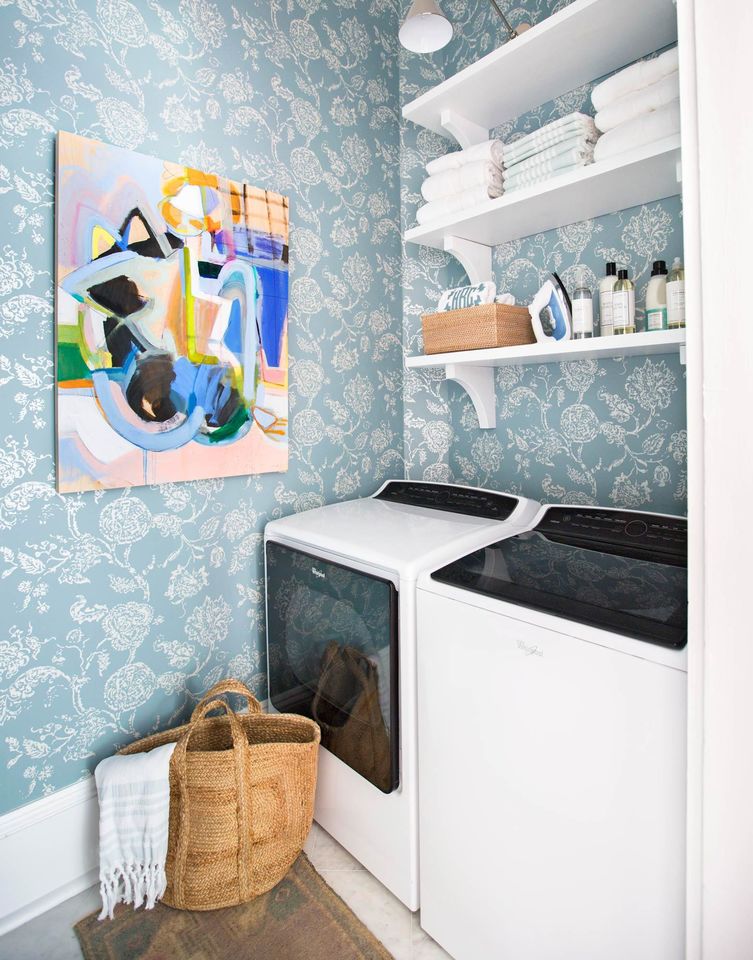Dryers make laundry duties so much more convenient. You can simply toss damp clothes or linens inside, press a button, and 30 minutes to an hour later, your laundry emerges dry and freshly fluffed. To ensure this process runs smoothly, however, some regular upkeep is required. Not only does cleaning your dryer on a regular basis help clothes dry faster, but it can also prevent serious damage to your home. According to the U.S. Fire Administration, clothes dryers cause about 2,900 house fires each year, and about a third of those result from a failure to clean the dryer. Proper maintenance involves more than just emptying the lint screen, so it's important to know how to clean a dryer, including the vent, drum, and exterior. Follow the steps below to clean your clothes dryer inside and out and keep laundry day on track.
How to Clean a Dryer Vent and Remove Lint
If you've ever taken clothes out of the dryer and found they were still damp, you might be dealing with lint buildup. Your dryer will run much more efficiently if air can flow easily. Removing lint, which is highly combustible, also reduces the risk of fire. Take these steps to help keep your dryer lint-free.
Step 1: Clear the lint screen.
Clean the lint screen or filter every time you dry a load of clothes. Pull the lint screen straight out to remove it from the dryer. Remove as much lint as you can with a brush, then wipe the screen with a used fabric softener sheet to pick up any remaining pieces of lint.
Step 2: Remove leftover lint inside the trap.
You occasionally need to clean the lint trap (also known as the lint-trap housing cavity). This is the area in which the filter fits. Use a long flexible dryer lint brush ($5, Target) and a gentle twisting motion to clean the cavity. Vacuum the brush clean, then repeat the process until you can't remove any more lint. Alternatively, try using the crevice attachment on your vacuum cleaner to clean out the lint.
Step 3: Clean the vent hose and pipe.
Once a year or so, clean the dryer's vent hose and pipe to keep the machine running efficiently. You can either hire a pro or do it yourself with the help of a dryer vent cleaning kit ($20, Amazon). To start, pull the dryer away from the wall and unplug it (or shut off the gas if you have a gas model.) Disconnect the duct from the dryer and the wall, and use the vent brush to loosen any lint or dust inside. You can connect the brush head to a drill for extra cleaning power and attach extenders for added length. Vacuum up any lint on the floor and inside the holes in the dryer and wall using a crevice tool attachment. Repeat this process on the outdoor vent where the exhaust exits your house.
How to Clean Inside a Dryer
Despite how carefully you check everyone's pockets, something unexpected can still make it into the dryer. The most likely culprits are pens, crayons, chewing gum, candy, and lipstick. Or maybe you washed a dry-clean-only item whose dye still clings to the drum. Stains inside your dryer can transfer to other clothes and ruin them. Here's how to clean the most common stains inside a dryer.
Crayons
Start by checking the drum for stuck-on pieces of crayon. Scrape them off with a plastic spatula or an old credit card. Wipe the drum with a soft cloth sprayed with a small amount of WD-40 ($5, Target) until the stain is gone. (Never spray the WD-40 directly into the dryer.) Once you have removed all of the crayon stains, unplug the dryer and wash the interior with warm, soapy water. Pay special attention to any areas that were wiped with WD-40. Finish by wiping the dryer drum with clean dry cloths or running a load of dry cloths through a complete drying cycle.
Ink
Run the dryer for about 10 minutes to warm up the metal drum and make it easier to remove the ink. Unplug the dryer. Dampen an old white rag with rubbing or isopropyl alcohol, and use it to remove the ink stains from the warm dryer interior. Change rags as needed to prevent ink from being redistributed. Rinse with a damp, clean white cloth. Before drying another load of clean clothes, check your work. Run an old white towel through a complete drying cycle. If it comes out completely white, you're done. If not, repeat the process.
Dye
If the entire dryer drum is covered with splotches of dye, it's unlikely you can remove all of it by hand. Instead, soak several old towels in a solution comprised of three gallons of hot water to one cup of household bleach. Wearing protective eyewear and rubber gloves, wring the towels nearly dry. Throw the towels in the drum, and run the dryer for 30 minutes at an air-fluff setting. Repeat the process if needed.
Candy or gum
Scrape off as much hardened candy and gum as you can with a plastic spatula or old credit card. Unplug the dryer. Use a blow-dryer to soften the remaining gum or candy with hot air. Then remove the softened particles by scraping them off with a plastic spatula or old credit card. Scrub the stained area with a rag dampened with an all-purpose cleaner, then wipe with a clean, dry cloth.
Lipstick
Remove as much of the lipstick as possible with a soft, dry cloth. (This will be more successful if the dryer is still warm.) Unplug the dryer and let it cool down completely. Wipe the remaining lipstick stains with a soft cloth dampened with rubbing alcohol. Plug the dryer back in and dry a small load of old towels to remove any remaining lipstick stains and traces of rubbing alcohol.
Even if there are no stains to remove, you should clean the interior of your dryer about once a month to prevent odors and residue buildup. Start by unplugging the dryer. Use a cloth dipped in warm, soapy water to wipe down the drum and dry with another clean cloth. If you clean the interior of your dryer with anything other than soap and water, delay using it again for several hours. Leave the dryer door open and let any fumes or residue dissipate before heating it up again.
How to Clean the Dryer Exterior
Clean the outside of your dryer every week or two to remove dust, detergent spills, and other buildup. Wipe the dryer down with a damp cloth dipped in soapy water. Remove the soapy residue with a clean, wet cloth, then wipe dry.



![A Tranquil Jungle House That Incorporates Japanese Ethos [Video]](https://asean2.ainewslabs.com/images/22/08/b-2ennetkmmnn_t.jpg)









